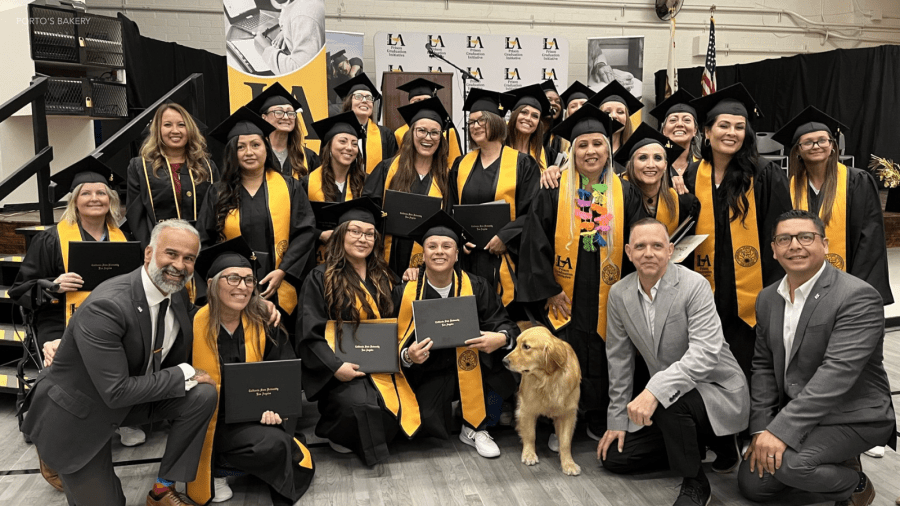Education
Incarcerated Women Celebrate First Bachelor’s Degrees at Cal State LA

On March 15, 2024, a significant milestone was achieved as 22 incarcerated women received their bachelor’s degrees through California State University, Los Angeles (Cal State LA). This event marked the first all-female graduating class as part of a partnership between the university and the California Department of Corrections and Rehabilitation (CDCR). Each graduate earned a Bachelor of Arts in Liberal Arts while serving their sentences at the California Institution for Women in Corona.
CDCR officials highlighted the agency’s commitment to education, stating it “leads the nation in higher education” for incarcerated individuals, with thousands enrolling in various programs each year. According to CDCR Secretary Jeff Macomber, education plays a critical role in reducing recidivism rates. “Today’s milestone reflects the power of education to transform lives,” Macomber stated. “By expanding access to higher education inside our institutions, we are not only opening doors for personal growth but also strengthening pathways for safer, healthier communities across California.”
California Governor Gavin Newsom also expressed his support for the education initiative, emphasizing its importance for both the graduates and society at large. “Higher education is key to the transformation and growth that we see today from many of the students graduating,” Newsom noted. “I’m proud to see them taking a step in the right direction to contribute positively to our society.”
The CDCR cites a study indicating that incarcerated individuals who participate in educational programs are 48% less likely to return to prison within three years compared to those without access to such opportunities. The Prison Graduation Initiative, a collaboration between the CDCR and Cal State LA, began in 2016 at the state prison in Lancaster. To date, a total of 73 students have earned bachelor’s degrees while incarcerated, including 21 graduates who successfully transitioned to complete their studies after parole.
In addition to the graduation program, Cal State LA has collaborated with CDCR to establish a “college campus” at the California Institution for Men in Chino, the first of its kind in a U.S. correctional facility. Currently, 59 students are pursuing degrees through a two-year, 60-unit program that focuses on career-oriented coursework.
This academic year, the Prison Graduation Initiative aims to support 180 students across three facilities: California State Prison in Los Angeles County, California Institution for Women, and California Institution for Men. One graduate, Jennifer Henderson, shared her transformative experience with the program. “LWOP [life without parole] now means live with opportunity and purpose,” she stated. “I am proud to be a part of a rehabilitative program that appreciates me for the woman I am today, and the value of my thoughts and inspiration of my voice. I chose to grow and develop my mind and spirit and empower others to live beyond any label.”
The success of this initiative underscores the potential of education to foster rehabilitation and create opportunities for those impacted by the criminal justice system. As more incarcerated individuals gain access to higher education, the hope is that communities will benefit from safer environments and reduced recidivism rates.
-

 Technology4 months ago
Technology4 months agoDiscover the Top 10 Calorie Counting Apps of 2025
-

 Health2 months ago
Health2 months agoBella Hadid Shares Health Update After Treatment for Lyme Disease
-

 Health3 months ago
Health3 months agoErin Bates Shares Recovery Update Following Sepsis Complications
-

 Technology3 weeks ago
Technology3 weeks agoDiscover 2025’s Top GPUs for Exceptional 4K Gaming Performance
-

 Technology4 months ago
Technology4 months agoDiscover How to Reverse Image Search Using ChatGPT Effortlessly
-

 Technology2 months ago
Technology2 months agoElectric Moto Influencer Surronster Arrested in Tijuana
-

 Technology4 months ago
Technology4 months agoMeta Initiates $60B AI Data Center Expansion, Starting in Ohio
-

 Technology4 months ago
Technology4 months agoRecovering a Suspended TikTok Account: A Step-by-Step Guide
-

 Health4 months ago
Health4 months agoTested: Rab Firewall Mountain Jacket Survives Harsh Conditions
-

 Lifestyle4 months ago
Lifestyle4 months agoBelton Family Reunites After Daughter Survives Hill Country Floods
-

 Technology3 months ago
Technology3 months agoUncovering the Top Five Most Challenging Motorcycles to Ride
-

 Technology4 weeks ago
Technology4 weeks agoDiscover the Best Wireless Earbuds for Every Lifestyle




















